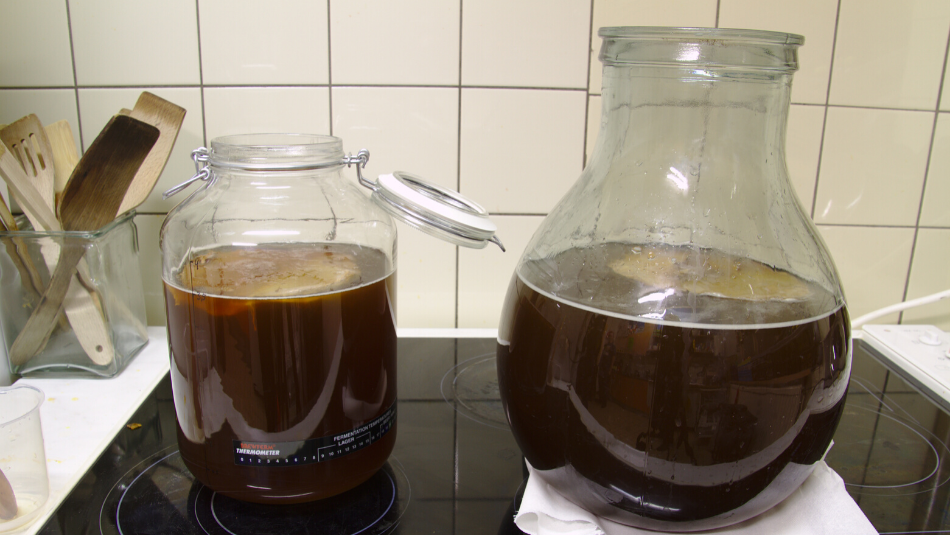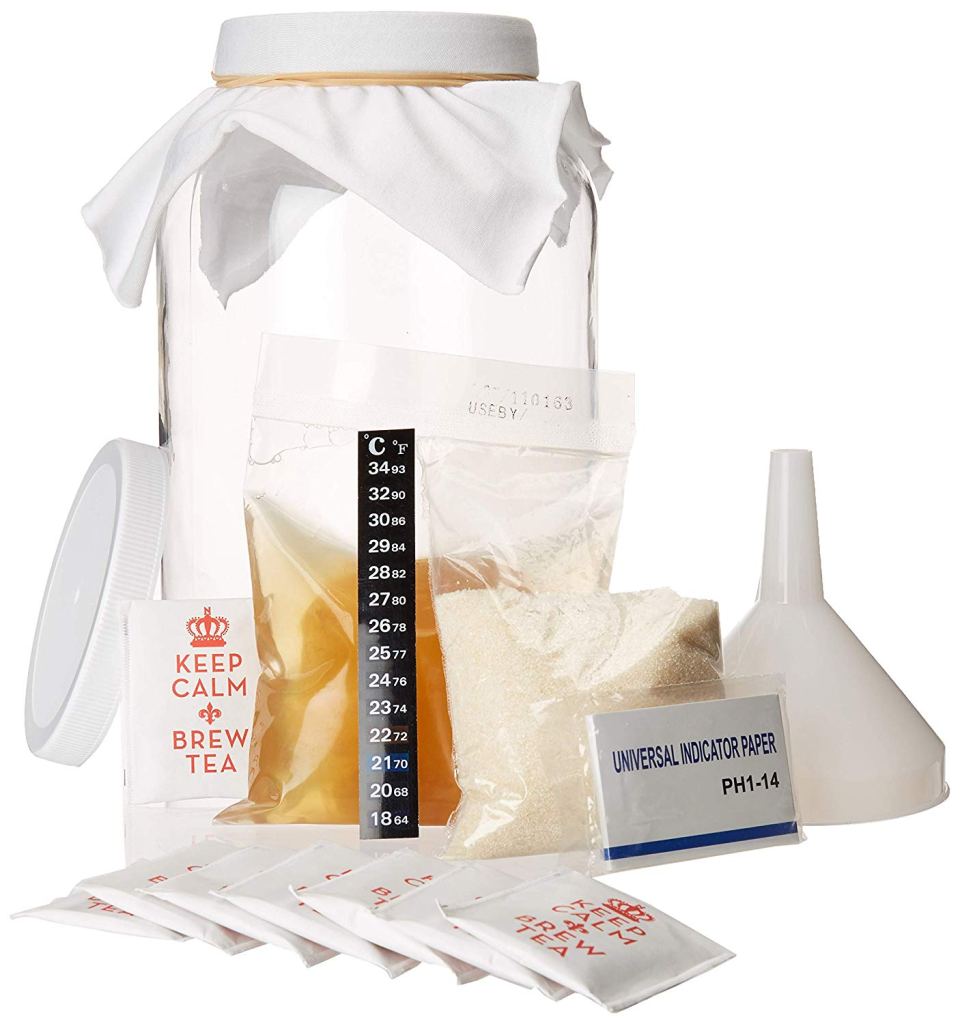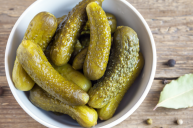Though kombucha didn't appear on the shelves of U.S. health food stores until the 1990s, humans have been swilling the fermented tea for more than 2,000 years. Legend holds that this mystical brew was first consumed by Emperor Qin Shi Huang in ancient China, one of the first civilizations to recognize the health benefits of kombucha. Whether you drink kombucha for those very purported health benefits or just because you enjoy the taste of the fermented tea drink, kombucha has a storied history with human health.
Millennia after the emperor took his first swig of "tea of life", kombucha is experiencing a spike in sales in the U.S. Today, the sweet, fermented, lightly fizzy tea is sold not only at niche health shops, but also mainstream supermarkets, convenient stores, and cafes. Meander down the organic drink aisle of a grocery store that sells kombucha, and you may stumble upon kombucha flavors ranging from Texas pear to watermelon jalapeño.
What You Need to Make Your Own Kombucha
Miloo's Kombucha Starter Kit comes with everything you need to make kombucha. Tea, sweetener, fabric, a 1-gallon glass jar, funnel, and a SCOBY is all included. The directions are simple to follow. Brewing your own kombucha can take over a week, so having everything you need all at once makes the process so much easier!
Sometimes referred to as "mushroom tea," homemade kombucha is fermented by a colony of bacteria and yeast, which react to form a mushroom-like mass on top of the tea. Once fermented, kombucha becomes slightly effervescent, with a vinegary smell and tart taste. Fresh fruit juice and other flavors may be added to kombucha at the end of the brewing process to make the drink more palatable as drinking it straight is an acquired taste, to say the least.
Kombucha is typically classified as a "functional beverage", or a nonalcoholic beverage with supposed health benefits. These purported healthy claims are chronicled in the book Kombucha: The Miracle Fungus. From beneficial probiotics to gut health, we've listed 10 of the most intriguing alleged kombucha health benefits below.
1. Detoxification
Teeming with enzymes and bacterial acids, kombucha is believed to aid in natural detoxification. Gluconic acid, which is found in kombucha as well as in fruits and veggies, may bind to toxins to help expel them from the body, according to scientific evidence.
Glucaric acid, also a product of kombucha tea fermentation, may boost the efficiency of the liver's detoxifying tracts. While for some, that may be more than enough reason to purchase their own SCOBY, or starter culture, others might need a few more reasons before adding regular kombucha to a healthy diet.
2. Improved digestion
There is mounting evidence that the combination of organic acids, polyphenols, enzymes, and probiotics in kombucha may promote a healthy digestive system and soothe an upset stomach. Probiotics, sometimes referred to as "good gut bacteria", can help deter or provide relief from problems like IBS, diarrhea, and constipation.
A healthy human body has three to five pounds of beneficial bacteria and microbes (called the "microbiome"), but the microbiome can be depleted by stress, alcohol use, antibiotics, and other harmful organisms. By drinking the fermented beverage kombucha, you may be able to help replenish lost gut bacteria.
3. Immune system stimulation
The healthy gut bacteria gained by drinking kombucha may help stimulate the immune system, which is thought to be closely connected to the living organisms in the gut. Probiotics, specifically from those in fermented foods and gleaned from the fermentation process, can strengthen our natural defenses against harmful microbes and some forms of illnesses.
When our natural microbiome is depleted, harmful microbes such as ones that cause ulcers, diabetes or cancer can take hold. Kombucha also contains DSL and vitamin C, which may fend off inflammatory diseases, tumors, cell damage, and other concerns.
4. Arthritis prevention
Another powerful compound found in kombucha is glucosamine, which can stave off and treat all types of arthritis. Glucosamines enhance hyaluronic acid production, which may help to protect cartilage and reduce arthritic pain.
5. Cancer prevention
https://www.instagram.com/p/CBa6jehnskB/
Recent research from Nature International Weekly Journal of Science highlights the anti-cancer power of the microbiome. The live microorganisms found in some kombuchas that can reinforce our natural defenses some forms of cancer and free radicals. These microbes may activate our natural cancer-killing cells.
Glucaric acid, which is found in kombucha and foods like grapefruit and cruciferous veggies, may help reduce cancer risk. Lactobacillus type microbes found in some kombucha may also activate our natural cancer-killing cells. Allegedly, President Reagan consumed kombucha daily to combat stomach cancer for its noted defense about free radicals. The health elixir is magic, what can we say?
6. Cholesterol reduction
Research further suggests that kombucha may help maintain healthy cholesterol levels and blood sugar levels. In studies with animals, kombucha was able to reduce levels of LDL cholesterol (or "bad cholesterol") while increasing levels HDL ("good cholesterol").
When it comes to health problems, as cholesterol, blood pressure, and heart disease problems are common, it's important to incorporate natural combatants into your diet in the form of good bacteria over harmful bacteria.
7. Energy enhancement
In addition to small amounts of caffeine, kombucha contains energizing B vitamins and iron. The iron may increase hemoglobin in the blood, thereby enhancing oxygen flow.
Many people home brew kombucha for this very reason, while some brands focus on the energy-boosting effects as one of kombucha's best benefits. A boost without the adverse side effects that come with a high concentration of caffeine? That seems like a good alternative.
8. Weight loss
When our healthy microbes are depleted, obesity and diabetes can result. The natural acids and antioxidant properties found in the beverage may promote fat loss.
Kombucha, like apple cider vinegar, is thought to increase metabolism when consumed before meals. The green tea and black tea varieties of kombucha are particularly effective by combining the antioxidant power of the tea and the symbiotic colony in the kombucha.
9. Enhanced athletic performance
https://www.instagram.com/p/CBKilOyjGNJ/
According to athletic enthusiasts, kombucha raises energy levels during exercise and aids in post-workout recovery, alleviating joint pain. Olympic athletes in the Soviet Union reportedly drank up to one quart of kombucha daily to prevent soreness caused by lactic acid accumulating in the muscles.
Combine this with the enhanced immune function you receive from the probiotic beverage, and you have a high-powered performance drink that's completely natural.
10. Mood enhancement
On of the health benefits of kombucha is a better mood. The B vitamins in kombucha, specifically vitamins B1, B6, and B12, may help battle depression, stabilize mood, and enhance concentration. The vitamin C in kombucha, in turn, inhibits the release of the stress hormone cortisol. How about that for an immortal health elixir?
Kombucha also contains naturally occurring trace amounts of alcohol, which can reduce stress and bolster positive feelings. Despite the extremely tiny alcohol content, kombucha is safe for pregnant women to drink, though one should check with a doctor before indulging.
This post was originally published on May 3rd, 2019.






